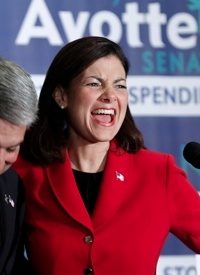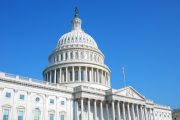
If any song is being sung at the headquarters of the Democratic National Committee today, it’s probably not “Happy Days Are Here Again.” At the White House it might be, “Singin’ the Blues” or “Make the World Go Away.” Republicans are, of course, singing happier tunes. But in New Hampshire, the theme might be found in a revised version of the Ernest Tubb hit of long ago, “Thanks A Lot.” Granite State Republicans could be crooning “Thanks, Ayotte” in tribute to their fast-rising political star, U.S. Senator-elect Kelly Ayotte.
In her first bid for elective office, the state’s former attorney general left her Democratic opponent, two-term Congressman Paul Hodes, blinking in the dust and perhaps even asking for the serial number of the tank that ran over him. Ayotte romped to victory with an apparent super majority, winning an unofficial 60 percent of the vote to 37 percent for Hodes. The 42-year-old political rookie was easily the top vote-getter in New Hampshire and might even have helped carry fellow Republican and former Congressman Charlie Bass across the finish line, as Bass, a Peterborough Republican, won his Second District House seat back with a narrow win over another political newcomer, Concord attorney Ann McLane Kuster. Bass held the seat for six terms before losing to Hodes in 2006. Ayotte, a Nashua resident, lives in the Second District, and her vote total there might have helped Bass as well as others on the ticket.
Even as Democratic Governor John Lynch won an unprecedented fourth two-year term as the state’s chief executive, New Hampshire Republicans prevailed virtually everywhere else on the ballot. The GOP won back control of both houses of the state legislature and took all five seats on the Executive Council. Bass’s win was accompanied by former Manchester Mayor Frank Guinta’s more impressive triumph over incumbent Carol Shea-Porter in the state’s First District congressional race. Unofficial returns showed Guinta taking the district with 56 percent of the vote, while Shea-Porter could manage just 40 percent.
Both Hodes and Shea-Porter first won their seats in the 2006 Democratic tidal wave and were reelected two years ago. But with an even stronger tide some have called it a tsunami running with the Republicans this year, Democrats in both districts were wiped out by the veteran Bass and by Guinta, who was running for the first time beyond the boundaries of Manchester. Guinta served two terms as alderman and two terms as mayor in the state’s largest city. He had previously won two elections as a state representative from a district within the city.
Lynch, whose previous reelections had been with 70 percent or more of the vote, was held to something less than a landslide this time, as he captured 52 percent to 46 percent for Republican John Stephen, a former assistant attorney general in the state’s Department of Justice and former head of the state’s Department of Health and Human Services. Stephen ran primarily on fiscal issues, charging Lynch with presiding over a 24-percent increase in state spending and signing into law 84 different increases in taxes and fees. Lynch was able to blunt that charge by pointing to declining revenues due to a downturn in the national economy, while at the same time taking credit for the state’s comparatively low unemployment rate. Approximately 5.5 percent of New Hampshire’s labor force is out of work compared to close to 10 percent nationally. And Lynch was able to point to the fact that numerous taxes and fees notwithstanding, New Hampshire still has neither a general sales nor income tax. In each of his four successful campaigns for governor, Lynch has taken the traditional New Hampshire pledge to veto a “broad-base” sales or income tax if the legislators should pass one. None has been passed on his watch.
Stephen had to contend with a heavily financed negative campaign by the Democratic State Committee, criticizing some of his hiring decisions at the state HHS and his later dealings as a consultant with the state of Rhode Island, which are reportedly under investigation by that state’s attorney general. The Stephen campaign stayed with the tax-and-spend theme, though independent expenditures by the New Jersey-based National Organization for Marriage funded “Lynch Lies” ads early in the year, lambasting the governor for his reversal on the issue of same-sex marriage. Lynch had repeatedly said he was against granting marriage status to same-sex unions, but last year signed a bill redefining marriage to include same-sex couples.
In 2007, Lynch lobbied for and signed a repeal of the state law requiring notification of a parent or guardian before an abortion could be performed on a minor. The law was passed by a Republican legislature and signed into law by Republican Governor Craig Benson in 2003. It was challenged by The American Civil Liberties Union of New Hampshire and Planned Parenthood of Northern New England and ruled unconstitutional by the U.S. District Court in Concord. Ayotte, then the attorney general, appealed the decision all the way to the Supreme Court, which found it unconstitutional in part and remanded it to the lower court, where it remained until the law was repealed.
But issues like abortion and same-sex marriage were rarely mentioned in this fall’s election campaigns, as candidates remained focused on fiscal issues and the faltering economy. The Tea Party movement was less visible in New Hampshire than in some states where immigration and other “hot-button” issues were more in play. But Ayotte received a well publicized endorsement from former Alaska governor and Republican vice presidential candidate Sarah Palin, though Palin did not personally appear in the state. Palin, the national figure most closely associated with the Tea Party, designated Ayotte as one of her “mama grizzlies” fighting to protect families from government policies and programs that create excessive financial burdens on taxpayers and undermine the moral foundations of family and community life.
Ayotte, as the state’s top prosecutor, personally tried and won a capital murder conviction against Michael Addison for the killing of Manchester police officer Michael Briggs, a conviction she highlighted in her campaign advertising. She will be one of several freshman senators who will face a daunting challenge in trying to rein in soaring federal deficits in the face of ongoing demands for federal assistance by organizations and interests in their home states. Ayotte will succeed retiring Senator Judd Gregg, who during four U.S. House and three Senate terms managed to maintain a reputation as both a fiscal conservative and a member of Congress effective in “bringing home the bacon” for a number of projects in New Hampshire. He has at least two university buildings named after him for his role in obtaining federal funds for programs in higher education and received an honorary degree from Saint Anselm College in Manchester after he obtained federal funding for the creation of the school’s New Hampshire Institute of Politics. Gregg, who retires undefeated in both primary and general elections, also served two terms as New Hampshire’s governor, from January, 1989 to January, 1993.
Photo: Republican Sen.-elect Kelly Ayotte, with husband Joe Daley by her side, celebrates winning the U.S. Senate race in Concord, N.H., Nov. 2, 2010: AP Images



